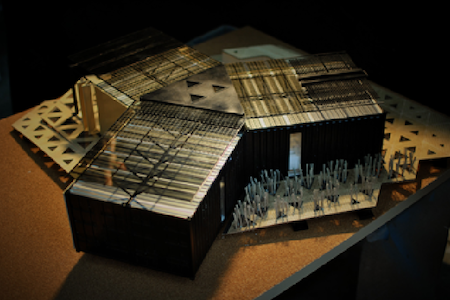Besides providing a solution to environmental problems, China’s SolarDecathlon team fromTongji Universityis also tackling an economic one with their entry,Y Container. Y Container’s concept stemmed from the fact that many young people, even those working professionally, cannot afford their own homes inChinadue to disparities between incomes and housing costs. Y Container was designed for a young couple living in Shanghai, where the problem of housing availability is prevalent.
The house is constructed from recycled shipping containers arranged together at 120-degree angles to form an equilateral Y shape. The fact that the main components of the house are prefabricated cuts costs significantly, and helps to reduce waste by reusing material. The containers are also designed to stand up to the elements, being originally intended to weather journeys at sea, with materials like waterproof polymers and zinc-coated steel. Its modular form allows it to be dismantled, transported to a new location and reassembled, and even expanded should the residents wish to do so. Combined with its clean power system that supplies heat, light and water, Y Container allows occupants to live cleanly and freely wherever they choose.

Y Container is designed to be adaptable to various circumstances. Its system uses heat recovery from thesolar thermalcollector that provides heat for the floor heating system and for hot water. Vacuum insulation and phase-change materials stop heat from transferring and dissipating, managing temperatures in a passive way. The house features a natural ventilation tunnel at the center, where fresh air is let in without energy use. Y Container also comes with arainwater collectingunit. Inside, living space is expandable and open, and the three “wings” of Y Container provide different sections of the yard that can be landscaped in various ways to integrate nature into the lives of the residents.
After the Decathlon, Y Container will be brought back to China to be part of the Green Energy Exhibition Area on the Tongji campus. The team would like to continue research on it in order to maximize its lifespan and potential.